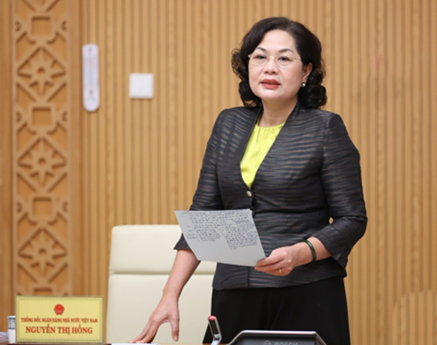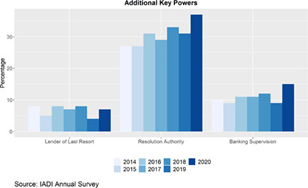
Governor of the SBV Nguyen Thi Hong made a speech at the meeting
Speaking at the conference, Governor Nguyen Thi Hong emphasized that in a very challenging context, the economy has been gradually growing over the quarters, with an average inflation rate of 3.16%. These are noteworthy results when compared to economies around the world and in the region. This development indicates that the government's and the Prime Minister's recent management solutions have been correct and effective.
According to Governor Nguyen Thi Hong, the foreign exchange market and the SBV's management have faced many difficulties and challenges due to the ongoing complex and unpredictable global economic situation. Central banks worldwide continue to maintain tight monetary policies and high interest rates. The USD index has risen sharply to 106, the highest level this year.
Domestically, although the average inflation rate for the first 9 months is 3.16%, it has been increasing month by month (0.45% in July, 0.88% in August, and 1.08% in September). However, the core inflation is increasing slowly, with an average increase of 4.49% in the first 9 months of the year, and there is a high possibility of controlling inflation in line with the National Assembly's target. Nevertheless, in macroeconomic management, there should be a comprehensive perspective, not just focusing on the annual target but also considering trends and risks in the near future in order to proactively manage the situation and avoid prolonged inflation, which could have negative consequences for the economy.
As a result, the SBV has closely monitored the situation, taking proactive measures with prudence and suitable timing. Due to the pressure from the USD index rising to 106, the need to lower interest rates to alleviate difficulties for the people and businesses, the exchange rate has increased by 3.7% compared to the beginning of the year at times. However, through monetary regulation using various tools and monetary market solutions, the exchange rate has currently increased by 3% compared to the beginning of the year. In the near future, the SBV will continue to closely monitor the situation and developments to proactively adjust its measures accordingly.
According to the Governor, as of September 20th, credit has increased by 5.91%, signaling a recovery in production and business. Typically, in the final months of the year, credit tends to rise, and it is expected to continue to increase in the coming period. Regarding the 120 trillion VND credit package, this is a credit program funded by financial institutions with interest rate support to contribute to the goal of building 1 million homes over the next 10 years. So far, 40 projects have been announced, with a total demand of around 16 trillion VND, in which nearly 90 billion VND has been disbursed.
"If in October, the National Assembly approves the Real Estate Business Law and Housing Law, which allows businesses to buy homes for their workers, the likelihood of increased demand for loans from this program will rise," emphasized by the head of the SBV. As for the 15 trillion VND fisheries credit package, since its launch in mid-July, around 5.5 trillion VND has been disbursed, accounting for one-third of the package's value, indicating a fairly positive implementation.
Regarding other tasks, including the implementation of the restructuring plan linked to handling bad debts and improving the plans for restructuring weak banks, the SBV has continued to provide guidance in line with the directives of the relevant authorities, the government, and the Prime Minister.
During the meeting, Governor Nguyen Thi Hong also put forward some recommendations to enhance capital absorption capacity, promote economic growth, while controlling inflation and ensuring sustainable macroeconomic stability.
Firstly, inflation has been on a continuous upward trend over the past three months, along with risks related to oil prices, food prices, and wage increases in 2024. These factors need to be closely monitored and assessed, especially in terms of price management policies. Therefore, comprehensive policy solutions are needed with the aim of controlling inflation and ensuring sustainable, continuous macroeconomic stability.
Secondly, credit growth for the economy remains low due to various reasons that have been discussed at many Government-chaired meetings. These reasons include reduced orders, businesses’ lack of outputs, the need to boost international trade and domestic market’s demand. Additionally, there are legal and procedural obstacles related to investment, especially in real estate projects, which require to be resolved.
For small and medium-sized enterprises (SMEs, which make up about 95% of all businesses in the country), they typically face financial capacity limitations. These businesses are currently grappling with the added challenges posed by the COVID-19 pandemic. The funding provided by credit institutions primarily consists of deposits from the public, which necessitates ensuring that loans are recoverable in line with the regulations of the Law on Credit Institutions.
"Therefore, in order to improve SMEs' access to credit, there is a need for comprehensive solutions, such as enhancing loan guarantees for these businesses," emphasized Governor Nguyen Thi Hong.

Panorama of the meeting
Department of Research and International Cooperation (translation)



























